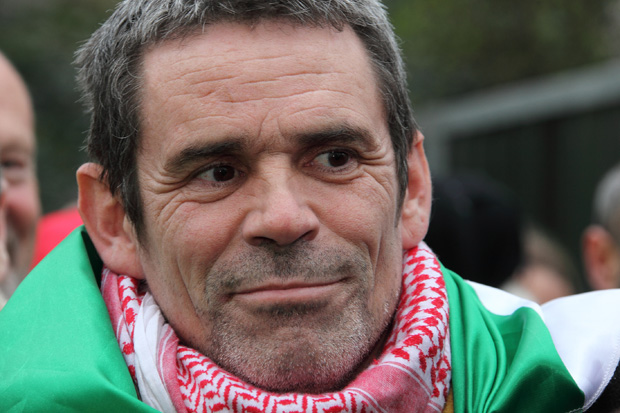Index relies entirely on the support of donors and readers to do its work.
Help us keep amplifying censored voices today.

Paul Conroy at a protest in London last year calling for peace in Syria. Image Demotix/Russell Pollard
Journalists have a bigger influence on how war is perceived than in years gone by, said war photographer Paul Conroy at the Cheltenham Literature Festival yesterday.
Discussing how journalists and photographers cover wars and the pressures they are under, Conroy, who covered Syria with Sunday Times journalist Marie Colvin, said: “Everything is in the instant now, battles have been influenced by the immediacy of information.”
Conroy described how he and Colvin got into Syria using underground tunnels and the assistance of rebels. They were smuggled into Syria through a 3km scramble down a storm drain, which he described as “the only way”. He added: “The risks were quite high.”
He also talked about the attack on the media centre they were operating from, which killed Colvin. Conroy, who was badly injured, was rescued and got out of the war zone so he could be treated.
When asked about how newspapers’ tightening budgets were affecting foreign new coverage, Sunday Times associate editor Sean Ryan, who was chairing the event and was Conroy and Colvin’s desk contact, said: “We will always cover the biggest conflicts.” Conroy called for more funding for foreign news coverage from the media in general.
The acclaimed war photographer, who also covered the Balkan conflicts, said it was now impossible for journalists to switch from being with one side to covering the other side of a conflict. It had been possible in the 1990s, but this was no longer the case.
Because of this journalists had to be wary of how they might be used to put forward a biased or inaccurate picture. “What we realised was that you are open to be used for propaganda. What you have to do is double check and get eye witness accounts.”
“Art is a force of creation, opposing the current destruction of the country” says Terek Tuma, a Syrian artist featured in #withoutwords. The new London exhibition displays fine arts and visual installations from Syrian artists influenced by the conflict engulfing their country, and the Syrian people’s struggle for freedom. Melody Patry writes
(more…)
Al Jazeera Arabic has posted an eyebrow-raising poll on their website, where they ask who has turned Syria’s revolution into a sectarian conflict. Voters can choose from two options: “Shia” and “Sunni.”
Really?
Special thanks to @Falasteeni for the link
Yesterday, open source advocate and software engineer Bassel Khartabil spent his 32nd birthday in prison. He was arrested by Syrian security forces on 15 March last year, and he has been in jail ever since. Khartabil was awarded an Index on Censorship Digital Freedom Award, sponsored by Google for his important work earlier this year. The Free Bassel campaign has started an initiative to shed light on Bassel’s situation called Free Bassel Sunlight, where they have called on supporters to advocate for Bassel’s release through using their resources to unearth more details about his situation.
We shared some birthday wishes to Bassel yesterday, but many more wishes were posted online yesterday —- here are just some of the heartfelt messages sent to him: